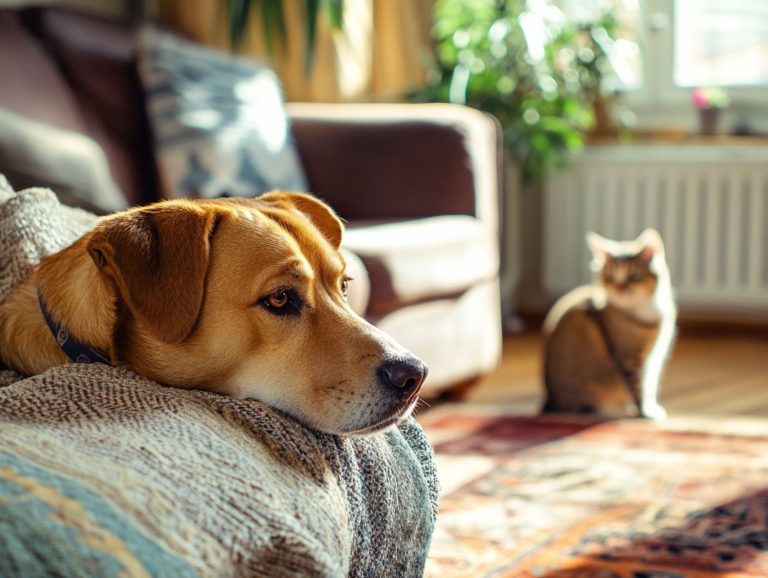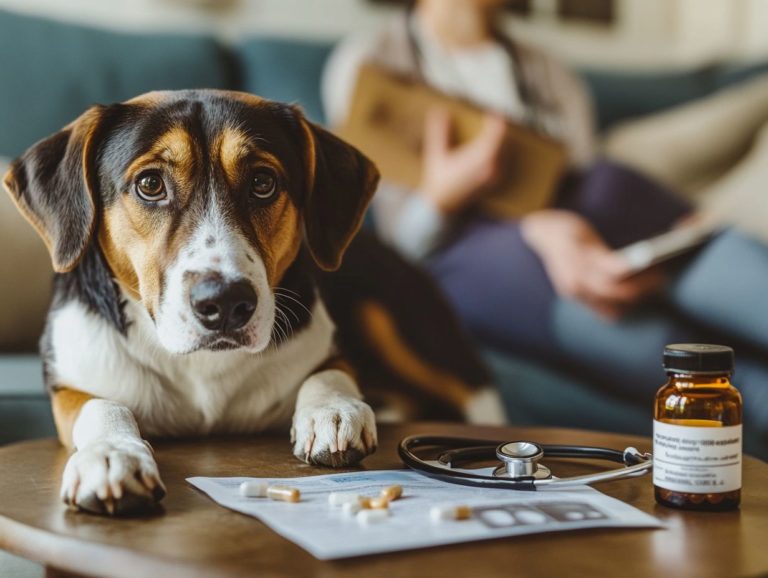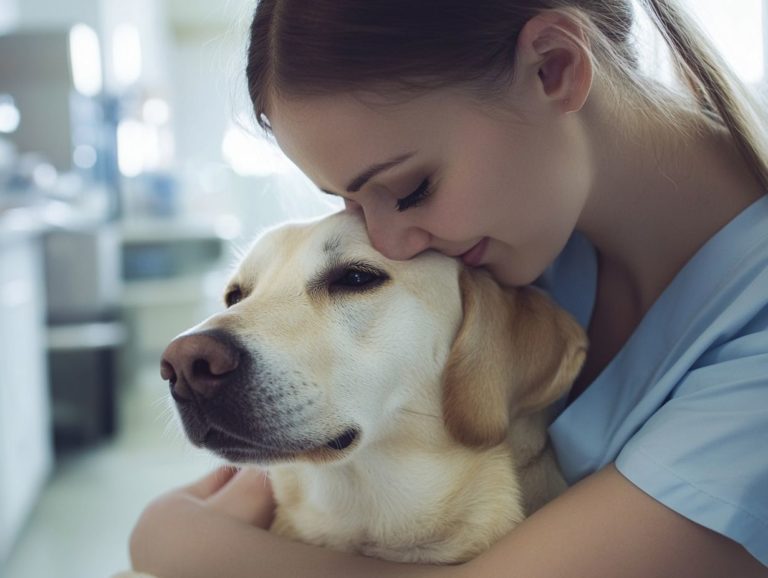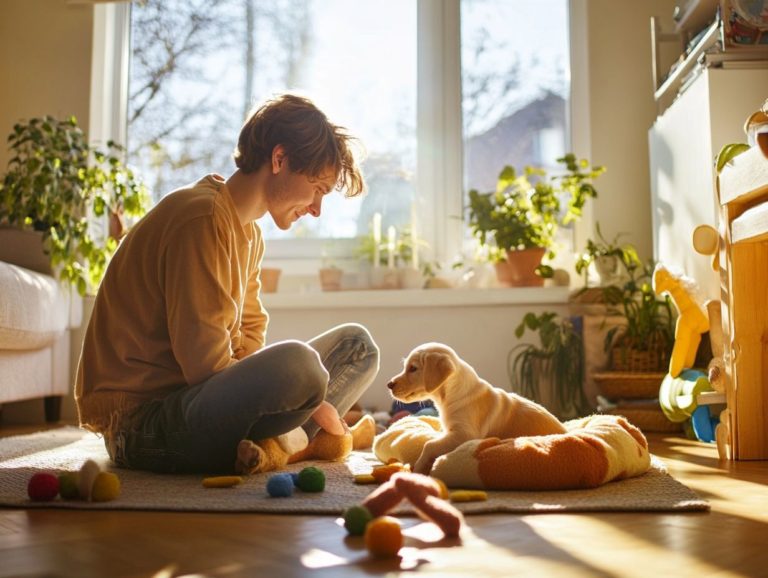How Important is Social Interaction for Anxious Pets?
Anxiety in pets can deeply impact their well-being, often leaving them feeling isolated and stressed. For pet owners like you, including military spouses and dog owners, understanding the root causes of this anxiety is essential to enhance your furry friend’s quality of life.
This article delves into how social interaction affects anxious pets, showcasing its numerous benefits, such as reduced stress and improved behavior. You’ll discover practical strategies to boost social engagement, including apps that facilitate social connection. Learn to recognize signs of progress and understand when it’s time to seek professional assistance.
Whether you’re a concerned pet parent or simply curious about the well-being of your Labrador Retriever, this guide offers valuable insights to help you support your anxious companion effectively.
Contents
- Key Takeaways:
- The Impact of Social Interaction on Anxious Pets
- Benefits of Social Interaction for Anxious Pets
- Ways to Increase Social Interaction for Anxious Pets
- Signs of Improvement in Anxious Pets
- When to Seek Professional Help
- Frequently Asked Questions
- What is social interaction and why is it important for anxious pets?
- How does social interaction benefit anxious pets?
- What are some signs that my pet may be in need of more social interaction?
- How can I provide social interaction for my anxious pet?
- Are there any risks to social interaction for anxious pets?
- Can social interaction alone cure my pet’s anxiety?
Key Takeaways:
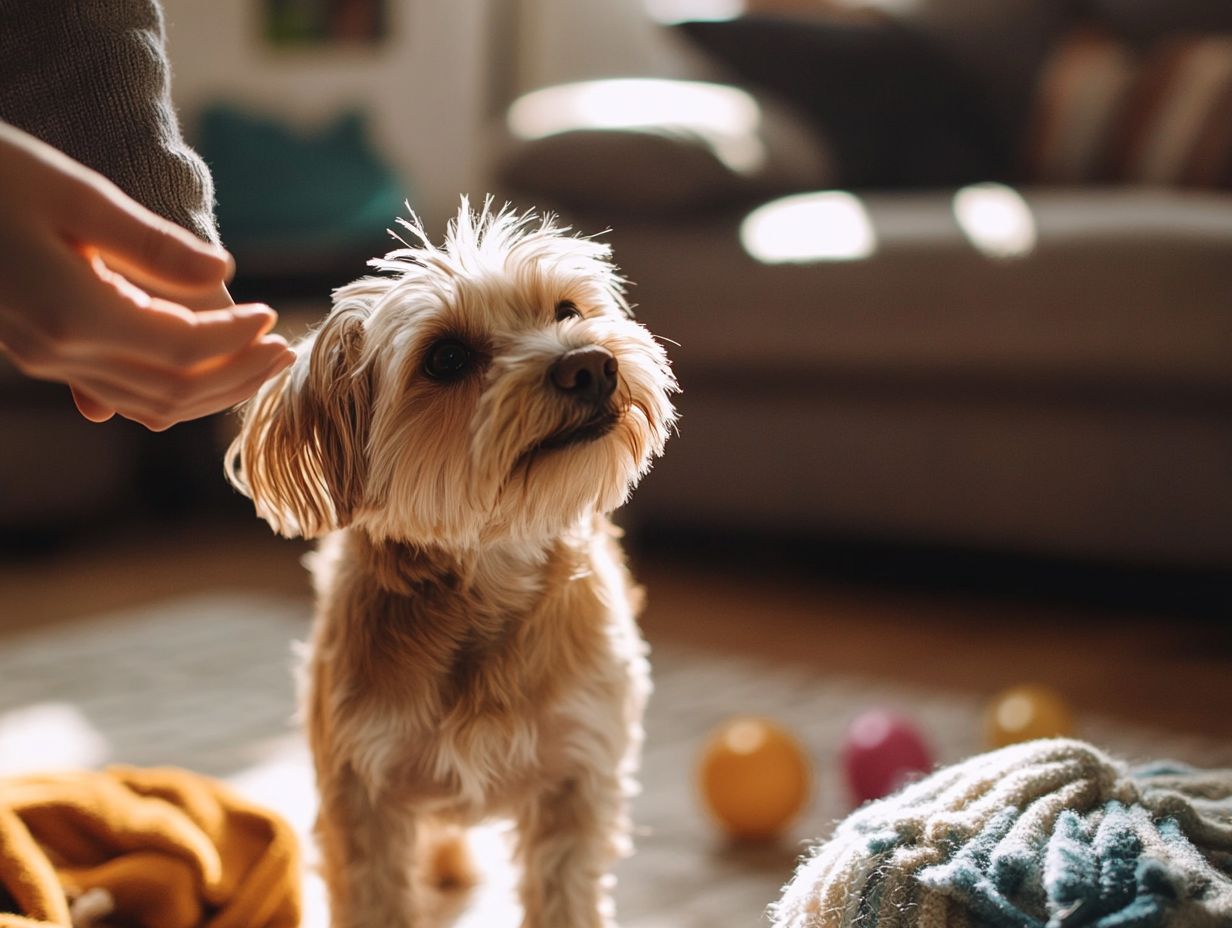
- Social interaction is crucial for anxious pets as it helps reduce stress and improve behavior.
- Interactive playtime and structured socialization with other pets, such as those found at Pet Ponderosa or local dog parks, are effective ways to increase social interaction for anxious pets.
- Keep an eye out for behavioral changes in your pet as a sign of improvement and seek professional help if the anxiety persists.
The Impact of Social Interaction on Anxious Pets
The impact of social interaction on anxious pets is profound and involves various factors, especially for discerning pet owners like you. Understanding the importance of socialization for anxious pets highlights how companionship and friendship play a vital role in nurturing a pet’s well-being.
In settings such as dog parks and through structured group walks, your pet can cultivate essential social skills. These interactions ease anxiety and foster positive behavioral growth, enhancing their adaptability during critical periods of development.
Understanding Anxiety in Pets
Understanding anxiety in pets means recognizing the many factors that contribute to their emotional struggles. These can include past trauma, lack of socialization, and destructive behaviors stemming from fear or stress.
Experts like Phil Tedeschi from the University of Denver highlight the impact of the human-pet relationship on a pet’s mental health. Consider a rescued dog named Riley Tucker Myers, who may show signs of anxiety due to past neglect or aggressive behavior.
Researchers stress the importance of consistent emotional support. This support enables pets to build trust and feel secure in their surroundings, reinforcing the significance of pet ownership. As a pet owner, you play an essential part in identifying triggers and establishing routines that create a sense of safety.
Acknowledge these factors and don t hesitate to team up with professionals to develop tailored treatment options. This collaboration enhances the well-being of anxious pets, leading to happier, more balanced lives for both the animals and their caregivers.
Benefits of Social Interaction for Anxious Pets
The benefits of social interaction for anxious pets are numerous and profound. Engaging in activities at dog parks or enrolling in structured socialization techniques for anxious pets can result in reduced stress levels and strengthened bonds of companionship.
These interactions encourage that delightful sense of puppy love, which promotes positive reinforcement in their behaviors. This mirrors the joy found in new friendships and social connections.
Don’t wait apply these strategies today and share your experience with your pet’s journey towards a happier life!
Reduced Stress and Improved Behavior
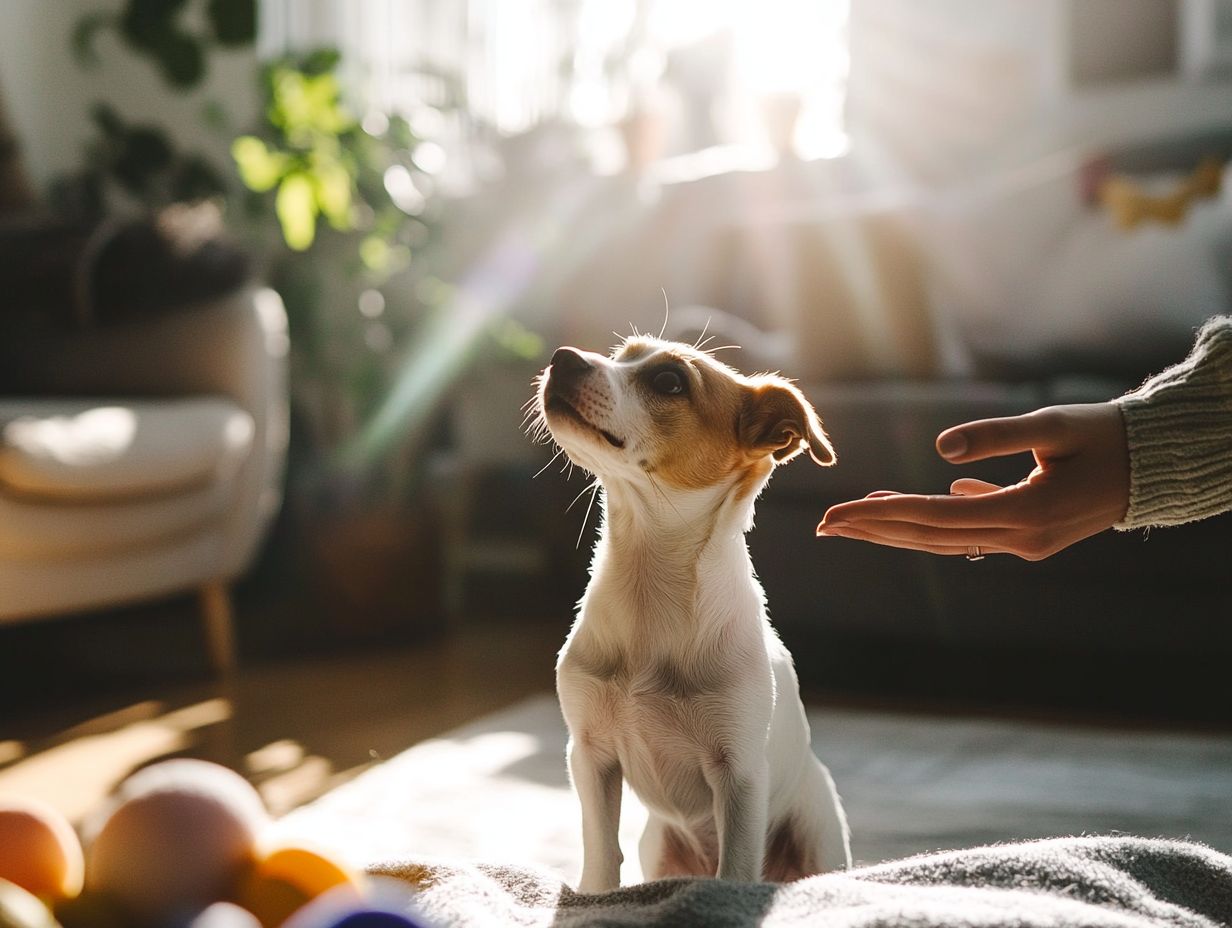
Reduced stress and improved behavior are direct benefits of more social time for anxious pets. This provides them with the vital emotional support and mental stimulation (activities that engage a pet’s mind) they crave.
Regular physical activity, such as daily walks or group walks, not only fortifies the bond between you and your pet but also helps mitigate those anxiety-driven behaviors.
Through interactions with other animals and humans, your pet can learn to feel more secure in their environment. This leads to significant reductions in fearful reactions, such as barking or hiding.
For example, a pet that once trembled at the sound of the doorbell might transform into a more relaxed and confident companion after enjoying regular playdates with friendly dogs. This enhances their social skills and dog manners in the process.
Incorporating exercise routines like daily walks, agility training, or using innovative apps for dog owners can bolster physical health and stimulate the mind. This creates a more balanced and harmonious living space. This comprehensive approach ensures that your pet thrives both emotionally and physically, fostering a sense of happiness in your household.
Ways to Increase Social Interaction for Anxious Pets
Enhancing social interaction for anxious pets can be accomplished through a variety of effective strategies. Consider incorporating interactive playtime through platforms like Tindog or Dig, enrolling in structured socialization classes, or leveraging modern apps tailored for dog owners. Additionally, understanding the importance of calm spaces for anxious pets can further alleviate their stress.
By engaging your pet in group walks at local dog parks or participating in training sessions at facilities like Young-Williams Animal Center, you can significantly boost their comfort and confidence in social situations.
Interactive Playtime and Training
Interactive playtime and training sessions are truly invaluable for you and your anxious pet. These moments not only help build companionship but also improve social skills and dog manners. This allows your furry friend to learn essential manners while basking in positive reinforcement.
Engaging in these activities strengthens the bond between you and your pet, enhancing their overall disposition.
Incorporating diverse forms of interactive play like fetch, tug-of-war, or puzzle toys can significantly stimulate your pet s mental and physical well-being. Opting for training methods that emphasize rewards, such as treats or praise, fosters positive reinforcement and creates a supportive learning environment.
This approach encourages your pet to participate willingly, rather than feeling pressured, leading to better behavioral outcomes.
These playful engagements do more than just provide exercise; they work wonders in reducing stress and anxiety, contributing to your pet’s mental health. They foster a sense of accomplishment for both you and your pet, ultimately nurturing a happier and healthier relationship.
Structured Socialization with Other Pets
Structured socialization with other pets, such as group walks at dog parks, is crucial to help your pet thrive! By engaging with their peers in a controlled environment, your pets can become more adaptable and confident in social situations, which is vital for their overall well-being.
These structured interactions really make a difference during training classes at places like District Dogs. Skilled trainers and fellow pet owners foster an atmosphere of encouragement and support. In such settings, anxious pets learn to navigate various stimuli like loud noises, other animals, and unfamiliar people. This helps them gradually acclimate and reduce their fear responses, leading to a healthier human-pet relationship.
With consistent participation in these socialization activities, you can cultivate improved self-esteem and resilience in your pets. These long-term benefits not only enhance their quality of life but also strengthen the bond between you and your pets, creating a harmonious household filled with happy pets.
Get started on these socialization strategies today for a happier pet!
Signs of Improvement in Anxious Pets
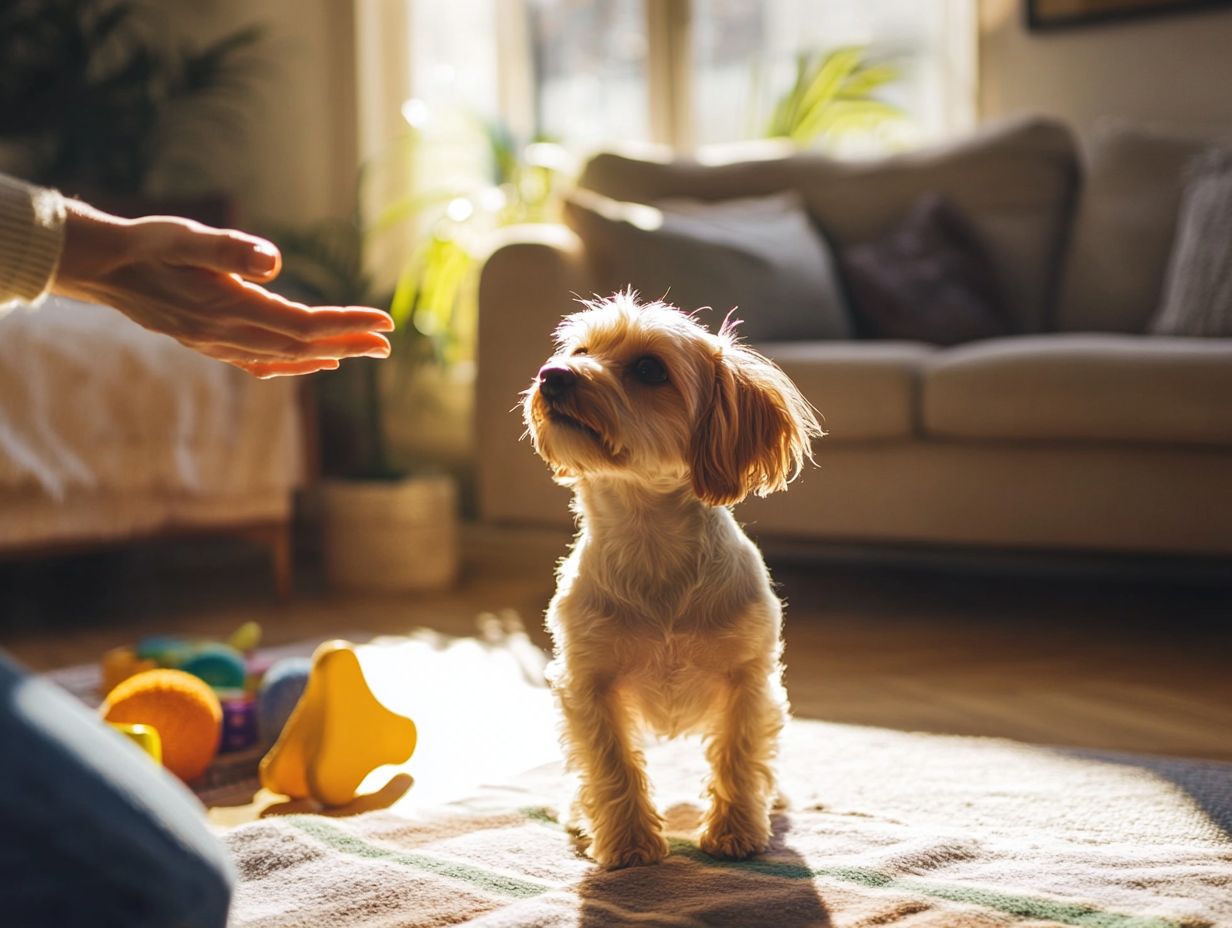
Recognizing the signs of improvement in anxious pets is vital for you as a pet owner. It allows you to appreciate their process of feeling more secure and the positive changes in their emotional support needs.
You’ll notice behavioral changes that reflect a growing sense of companionship and comfort. Positive experiences in social settings, such as at Pet Ponderosa or local dog parks, can lead to remarkable transformations in your pet’s demeanor and confidence, highlighting just how far they ve come.
Behavioral Changes to Look For
Behavioral changes to look for in anxious pets can be quite remarkable. These changes can range from improved social interaction to a newfound confidence in various situations.
These positive shifts are crucial on their journey toward better mental health and often reflect a deepening bond between you and your pet. This signifies a successful companionship strengthened by ongoing communication.
As you observe your anxious companion becoming more comfortable with new people or environments, you may notice a reduction in defensive behaviors like growling or hiding. An increase in playfulness is another telling sign; when your pet begins to engage more enthusiastically in interactive games or shows curiosity about new objects, it demonstrates a willingness to explore and connect, indicating the positive effects of socialization.
Changes like seeking comfort from you instead of retreating indicate a blossoming trust. These changes boost your pet’s happiness and well-being, showcasing the importance of companionship in the human-pet relationship.
When to Seek Professional Help
Recognizing when to seek professional assistance for your anxious pet is essential. It’s especially important when you notice signs of severe anxiety that lead to destructive behaviors or withdrawal, which can be overwhelming for both pets and their owners.
Experts, such as Phil Tedeschi from the University of Denver, emphasize the importance of timely intervention and effective treatment strategies. These methods can help restore emotional balance and significantly enhance your pet’s overall quality of life, ensuring a healthier human-pet relationship.
Identifying Severe Anxiety and Seeking Treatment
Identifying severe anxiety in your pets is essential for ensuring their emotional well-being and overall welfare. It can manifest in various destructive behaviors or distress signals, such as whining or trembling, indicating they are stressed.
Seeking timely treatment from professionals can significantly alleviate these issues and enhance your pet’s quality of life, fostering a sense of security and companionship.
Your pets might show signs like excessive barking, pacing, or hiding, all of which indicate they’re grappling with their mental state. It s crucial for you to recognize these behaviors early; ignoring them could lead to worsening anxiety and even more behavioral problems.
Professionals can provide tailored plans to change unwanted behaviors or safe and effective medication options. By addressing anxiety promptly, you not only enhance your pet s daily comfort but also strengthen the bond you share. This leads to a happier and healthier companion.
Frequently Asked Questions
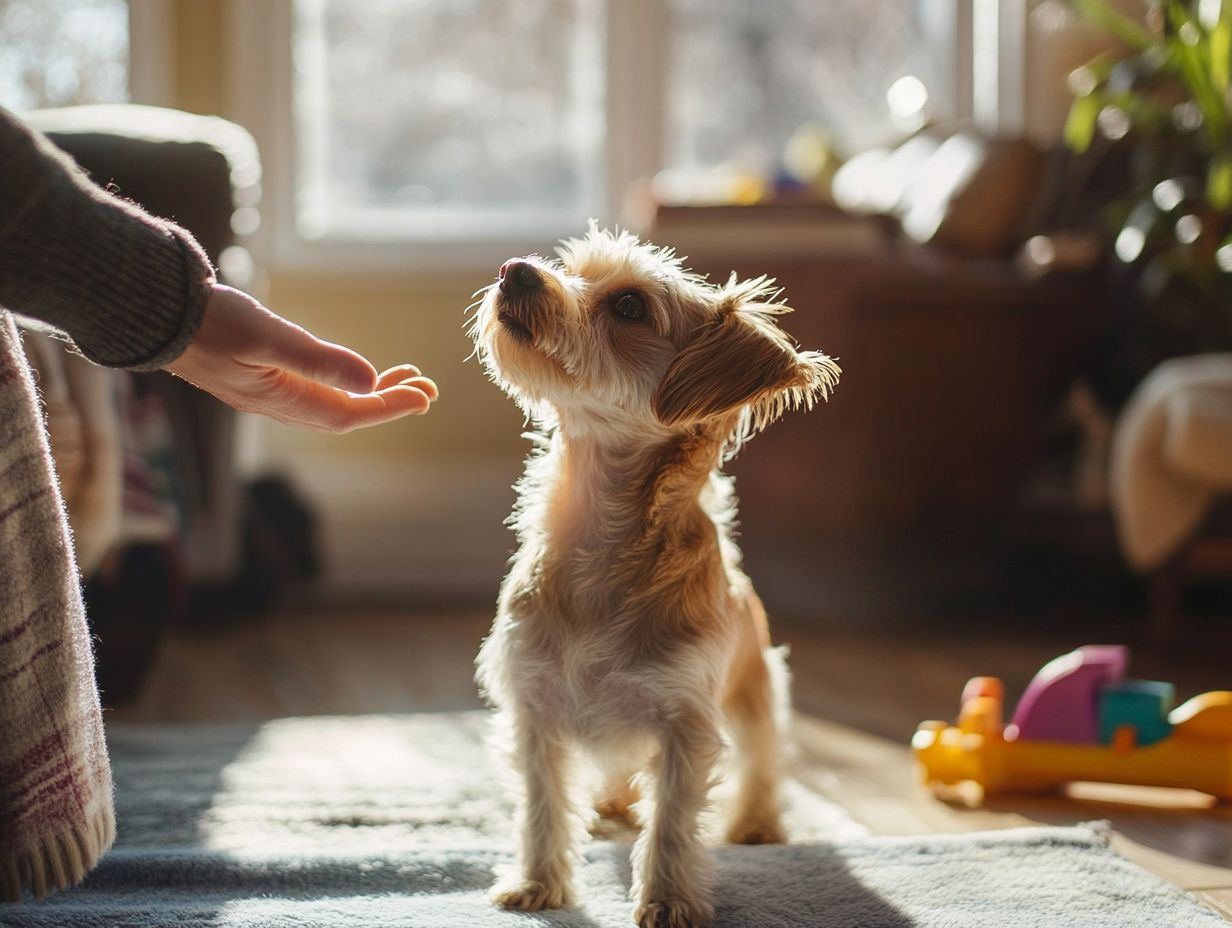
Social interaction refers to the communication and engagement between an animal and other animals or humans. It is important for anxious pets because it helps them feel more comfortable and secure in their surroundings, reinforcing the importance of routine for anxious pets.
Social interaction can help anxious pets by reducing their stress and anxiety levels. It provides mental stimulation and improves their overall well-being. Understanding how important a calm owner is for anxious pets can also help them develop better social skills and build confidence.
Anxious pets often show fear, aggression, or withdrawal in social situations. They may also become destructive or excessively vocal when feeling overwhelmed.
Gradually introduce your anxious pet to new people and animals in a positive environment. Engage in activities like playing or training to strengthen your bond.
Social interaction can greatly benefit anxious pets, but always prioritize their safety and comfort. To further support them, consider the importance of mental stimulation for anxious pets. Monitor their behavior closely, as some pets may not respond well to certain situations.
Social interaction can help manage anxiety but is not a guaranteed cure. Combine it with proper training and, if needed, medication for the best results.

